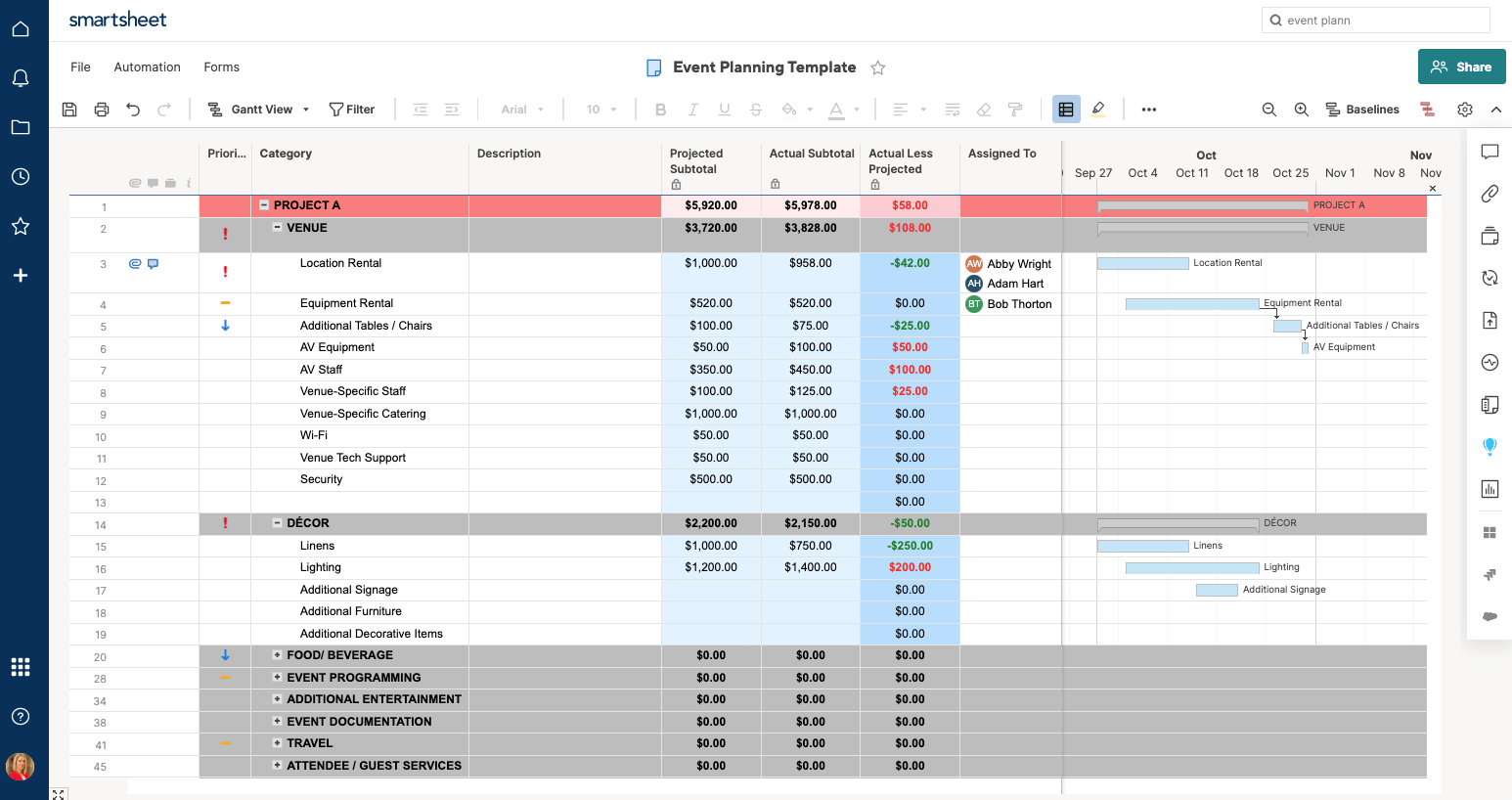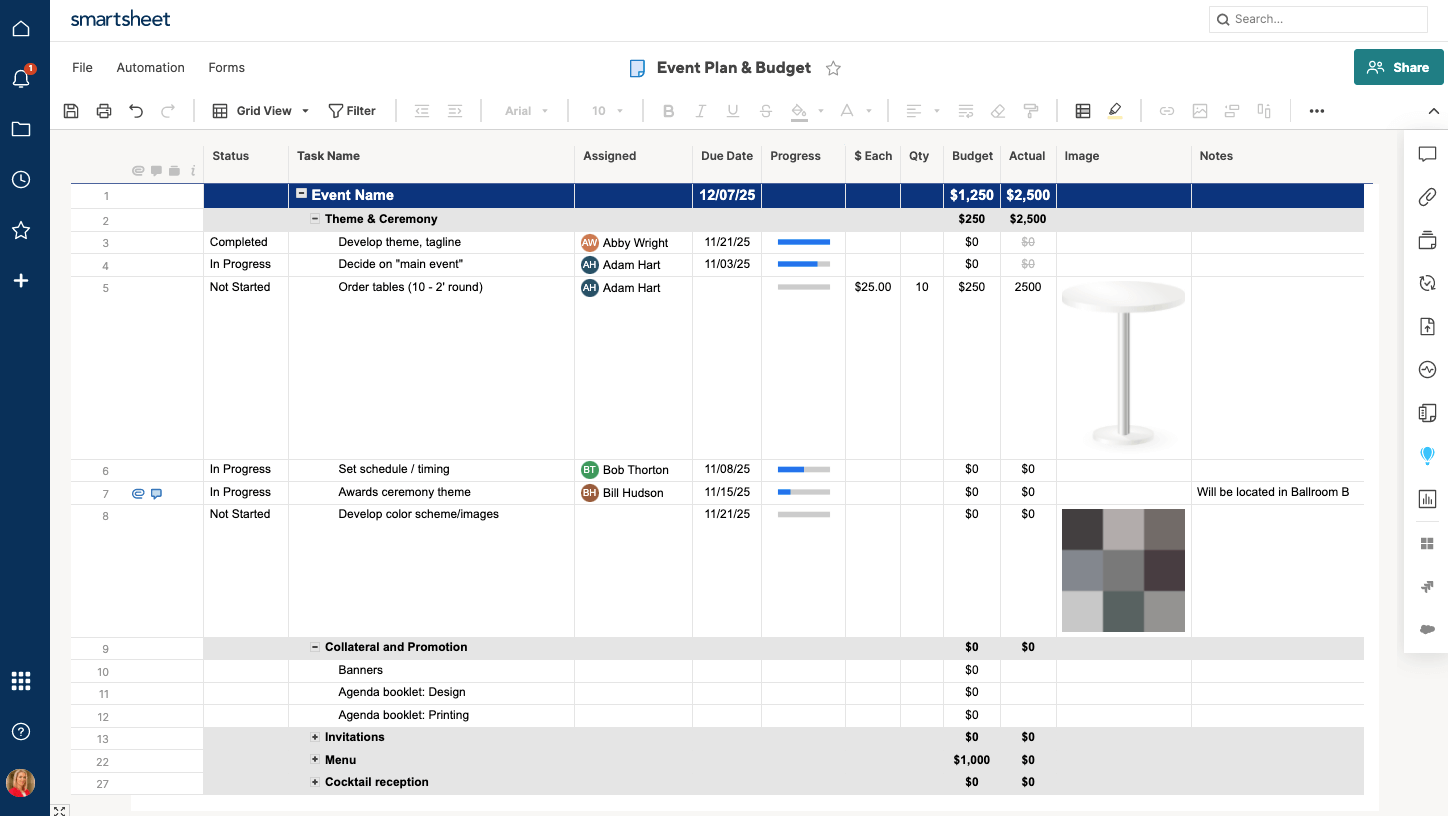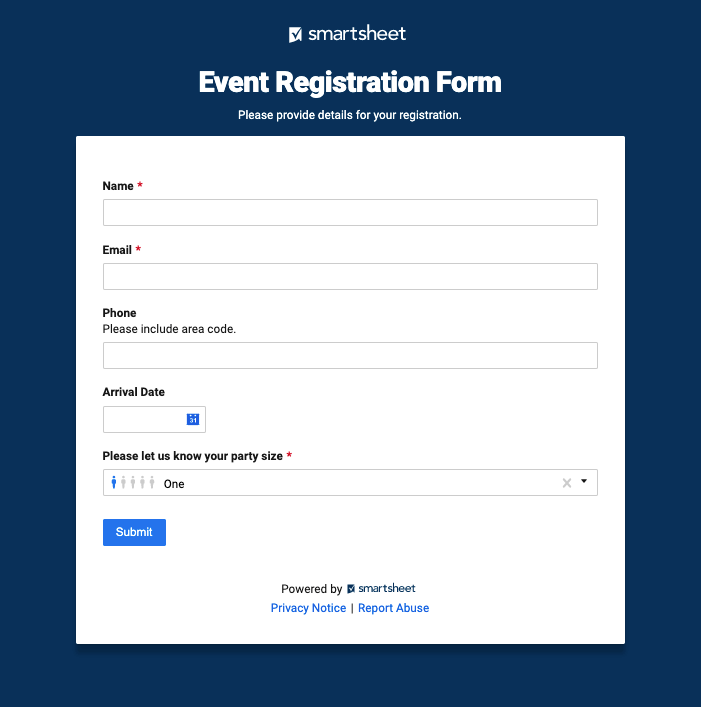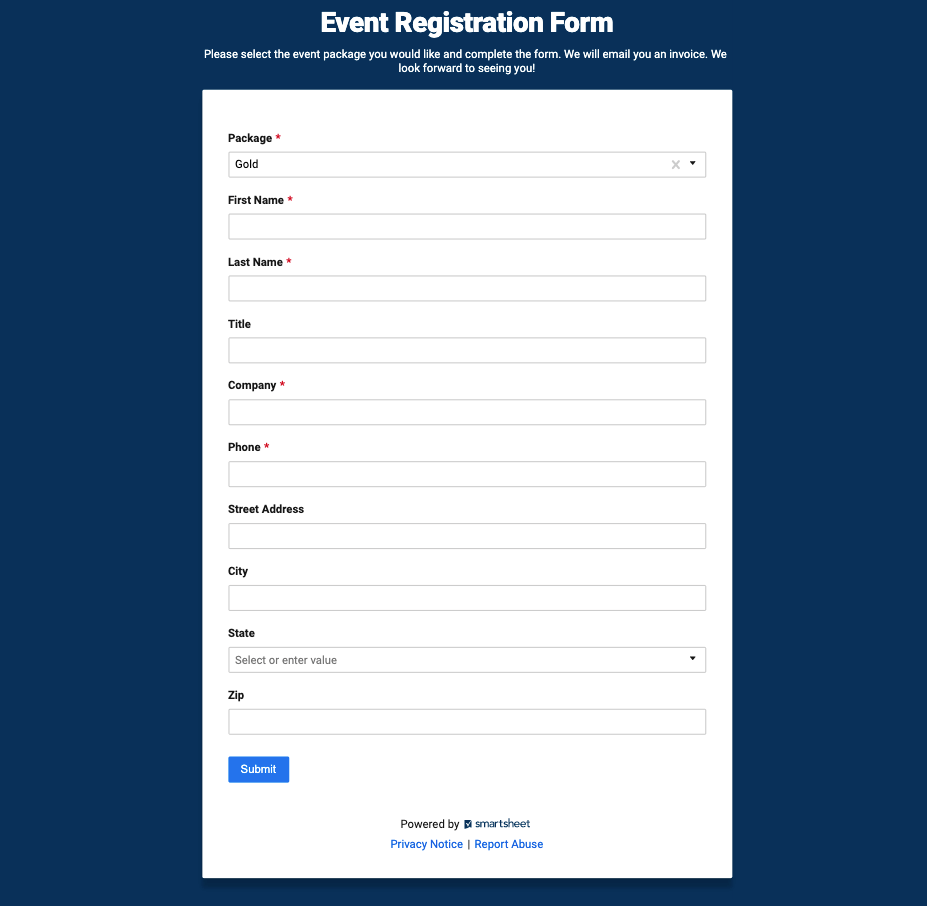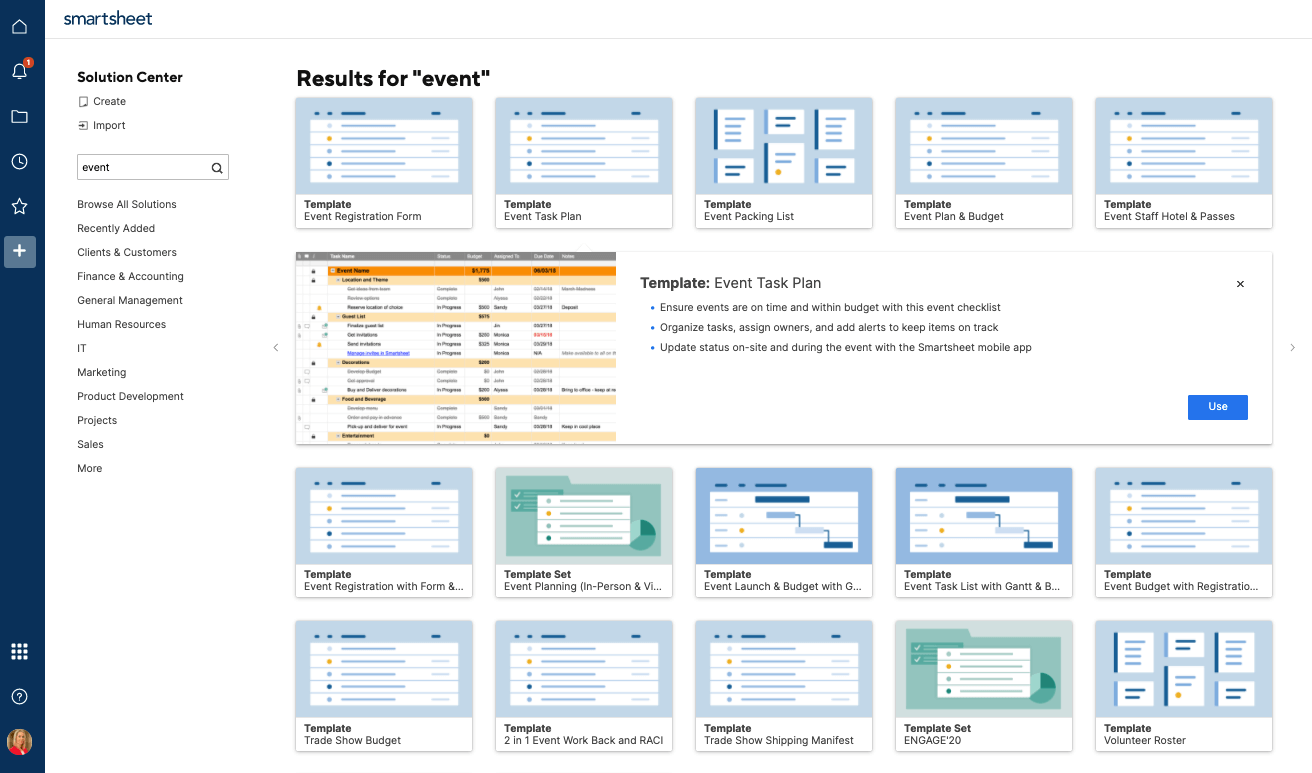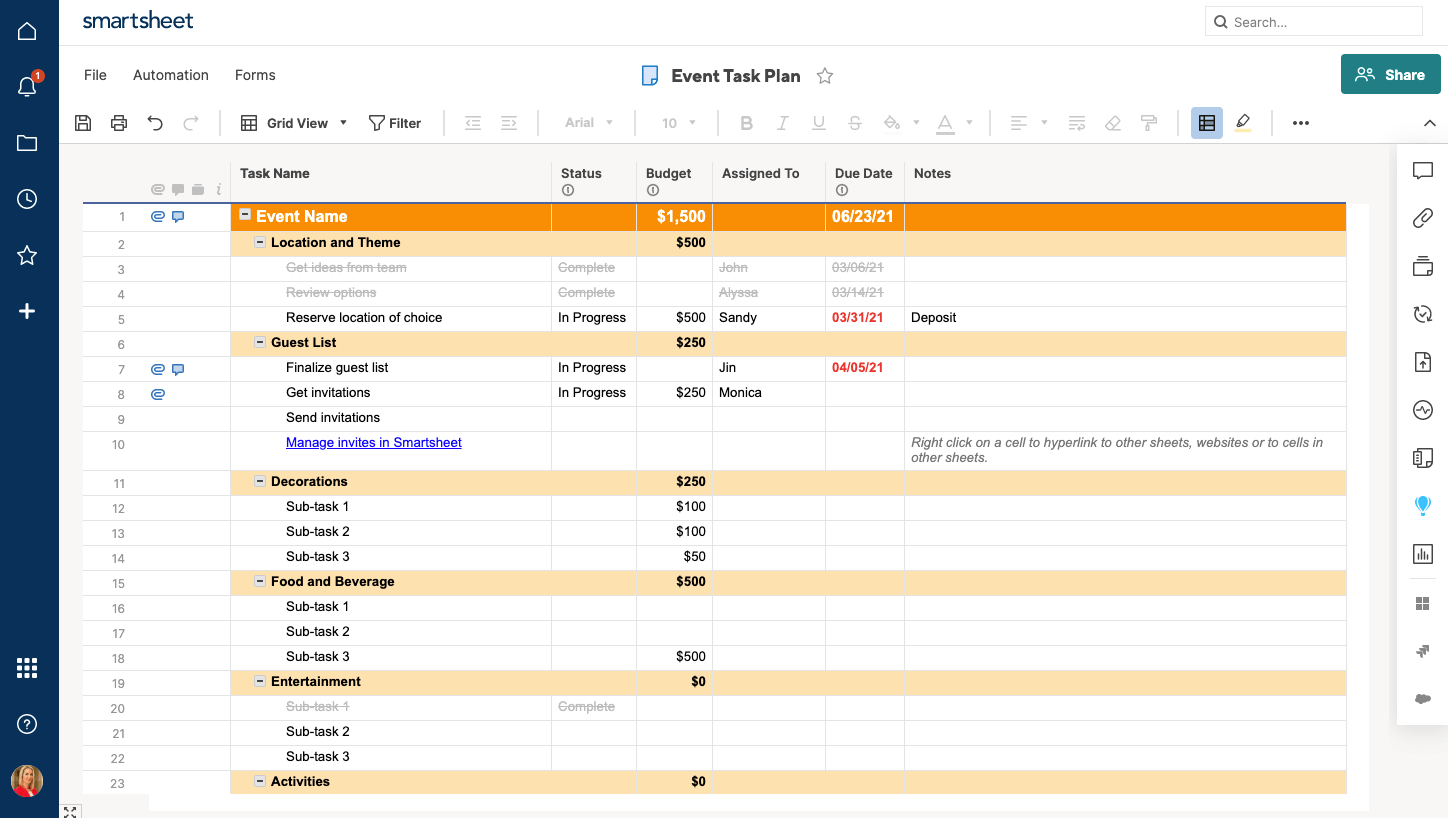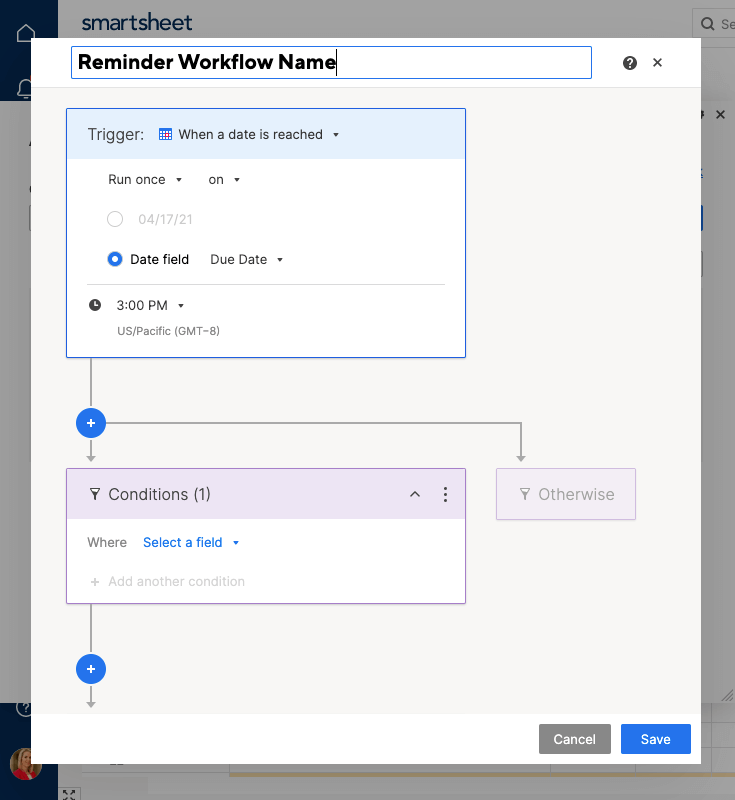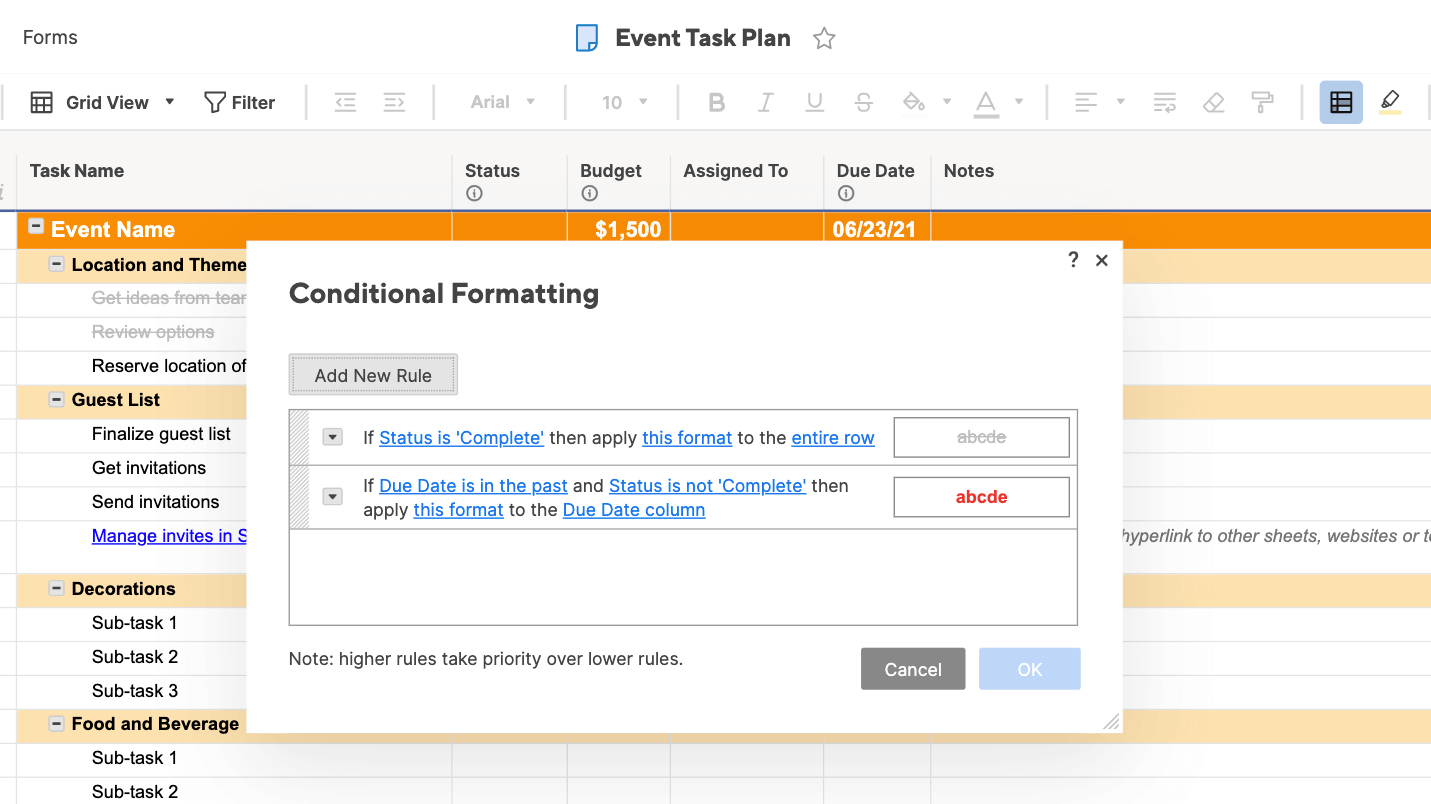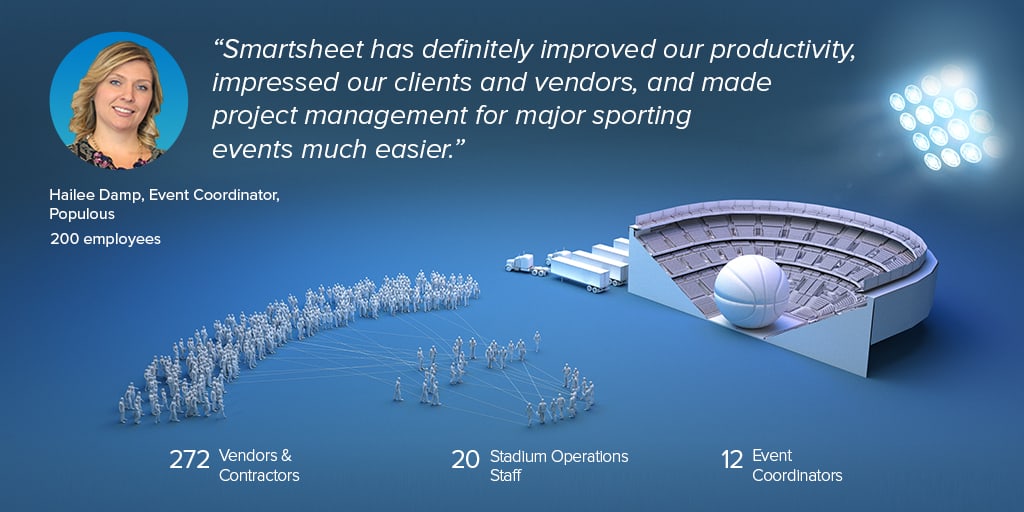Managing Events From the Cloud
More recently, project managers rely on desktop applications to manage their events. This could be anything from Microsoft Excel to Microsoft Project*. The challenge with desktop apps is that they require continual manual updates. The manager of the event has to contact each team member to get the status of their tasks, bring up the file from their hard drive, make updates to the file, then re-save. And when team members want to see the status or the calendar or even tasks that are assigned to them, the manager must either export the data into a readable file (as in the case for most when using Microsoft Project) or email out the file for everyone to see.
However, as multiple versions are created within team member’s individual hard drives, you end up with varying versions and everyone gets confused about which one is the latest version. Many companies may use network applications like SharePoint to upload a project file and then have individual team members ‘check out’ that individual file to make updates. But this process often gets ignored by individuals. Particularly those that are not as technologically savvy. So you have people bypassing the checkout system, making updates and forgetting to re-upload to the server, and ending up with multiple versions yet again.
Thankfully, software and cloud technology have made huge advances in delivering the types of tools that people can use both professionally and personally to project manage the smallest to the biggest event. This type of event management software, often referred to as either online event management software, web-based event management software or cloud-based event management software, is built with collaboration in mind. It allows the project manager to get everyone’s tasks on a clear, visual schedule. One where multiple people can be updating their status at the same time and everything is tracked in one place.
No longer do team members need to send emails with status updates or try to call individuals. No longer does the manager have to export plans from the management software on their hard drive, email out, ask for updates, get them all back at different times, and then manually update the plan again on his or her hard drive. Everything is housed in the cloud - on a network server that allows a number of different users to log in, check out the plan, make updates, and know exactly what the latest is.
*Microsoft is retiring MS Project Online. Learn more about using Smartsheet as a Microsoft Project Replacement.
Events Continue to Grow as Key Element of Marketing and Sales Strategies
Attending, organizing and running events is key for almost every organization, including corporations, government agencies, non-profits, legal firms, schools, and many more. And it continues to grow. In fact, a comprehensive 2014 industry survey by the Event Marketing Institute (EMI) - one that surveyed both companies that hold events and the consumers and/or users that attend them - discovered some key findings highlighting how different companies are realizing the benefits of events and are continuing to invest in them.
Some of the key findings include:
- Organizations increased their event budgets by approximately 5% in 2014.
- 14% of organizations say they see an ROI that is greater than five-to-one from their event programs, compared to 7% that indicated this level of ROI in 2013.
- 59% of organizations say they are using events as a key strategy for launching new products, up from 50% in 2013, and 48% in 2012.
- 96% of consumer respondents said that if they were interested in the product or service promoted at the event, participating made them more inclined to purchase.
- 74% of event participants have a more positive opinion about the company, brand, product or service being promoted after they attend an event.
It’s evident that as more and more companies hold events, and more people attend them, the need for robust, cloud-based event management software is critical. These events require astute management in order to be successful.
Benefits of Cloud-Based Event Management Software
The right event management software not only helps you pull off a successful event, one where everything comes together the way it was planned, but it also provides a number of other benefits you may not have considered.
Using cloud-based event management software helps you:
- Increase attendance
- Increase participant engagement, as well as team engagement
- Optimize the use of the venue the event is held in
- Provide better services at the event
- Improve relationships with attendees
- Improve ROI
Using Smartsheet to Manage Events
There are a variety of project management software tools that can be used to manage events, but not many are cloud or web-based. On top of that, most are geared toward the expert and ardent project manager and can be daunting and complex to learn for most individuals. And even further, not many have the types of features you need to create an event that can reap all of the benefits previously mentioned.
There is one cloud-based project management software tool, however, that is perfectly suited for event management. And that’s Smartsheet.
Smartsheet is a cloud-based, work management and collaboration tool. It is fully hosted, so you don’t need to download anything, you don’t need to install anything -- you simply sign up and start building your project plans right away. It has all of the essential features you would need to manage any project or event, complete with robust collaboration features including file attachments, comments, calendar views, forum comments, and more.
Collaboration is a key feature of Smartsheet, and allows everyone involved on any project to contribute to the plan, provide their own status updates, attach relevant files, and always see one version of the details. Plus, Smartsheet has a powerful mobile app that works on iOS and Android mobile operating systems, allowing project managers and team members to update status of tasks, review details, or collaborate on the go.
Managing Your Event with Smartsheet
No matter what event you’re planning, Smartsheet gives you and your team (including all of the people outside of your organization you need to work with, like caterers, musical performers, florists, drivers, shippers, and printers) the ability to plan, collaborate and execute, all without ever sending an email.
Smartsheet provides a number of pre-built project templates to help you create your event plan quickly and easily.
Here are a few of the templates and features that allow you to create a collaborative events plan.
1. Simple Events Task Plan
If your event is not too complicated and is fairly straightforward, like a big birthday party, holiday event, or all-company meeting, then the Simple Events Task Plan template is a great start. It provides all of the basic elements you need: location, theme, guest lists, decorations, food and beverage, entertainment and activities.
Features of the Simple Events Task Plan
With the Simple Events Task Plan, you can:
- Set up and assign all the tasks required to execute your event
- Create automated alerts to notify team members or vendors when a task is coming due
- Customize and track your budget
- Start comments with other team members to share details in real time
- Attach specific documents like invoices or contracts so that the right parties can access details as needed to complete their tasks
- Allow team members to update their status
2. Event Planning and Budget
For business events, trade shows, large meetings, and conferences that have a lot of moving parts, the Event Planning and Budget template works perfectly to help you seamlessly execute and deliver an amazing event. You can consolidate due dates, task status, budget, and spend in the same plan.
Features of the Event Planning and Budget Template
With the Event Planning and Budget Template, you can:
- Use the comment and attachment features to involve multiple collaborators to help make initial decisions on items such as theme, schedule, awards, and any other customized element
- Collaborate with outside vendors to manage key event pieces such as setting up audio/visual equipment, printing invitations and collateral, and shipping materials
- Store contracts, floor plans, and invoices
- Enable Gantt view to see a visual timeline of all the tasks, or work within a calendar view to visually depict tasks and milestones on their due date
- Request updates from all team members and vendors on task status, and have them automatically sent from the event project sheet straight to their email
- Set budget and tasks for designing, purchasing and distributing event invitations
- Set budget and tasks for designing and printing promotional collateral
- Track spending and scheduling for food catering
- Coordinate all entertainment options for the event
3. Event Web Forms
Smartsheet has a powerful, built-in forms component, letting event managers customize an online web form with a unique URL that can be sent out right from the project sheet. These web forms are easy to use, easy to set up, can be customized for your specific needs, and are a quick and convenient way to gather event information from vendors, participants, team members and anyone else. These forms can be used as event registrations, pre and post-event surveys, event topics survey (voting or contributing), and more. Once the web form is completed by a user, all of the information is populated into one project sheet, where it can be sorted, shared, and tracked. You can even track who submitted what. And best of all, it works great on mobile devices.
Features of the Event Web Form
With the Event Web Form, you can:
- Run pre and post-event surveys to gather feedback from audiences on topics, presenters, food, entertainment, location and more. They are easier to use than hard-copy surveys - preventing any manual re-entering of information - and much easier to centrally collect and analyze all user data.
- Send out and collect event registrations
- Log status details or other brief notes about each attendee registration
- Run user / attendee voting surveys on anything from food, to topics, to budget
- Collect registrants' email addresses for follow up
- Set alerts for attendee and presenter arrival dates and sheet changes
5. Event Registration Form with Financial Tracker and Summary
Similar to the Event Web Form template, the Event Registration Form with Summary template adds in the financial component you might need to have a real-time view of expected registration revenue and attendance. Easily send out and collect event registrations and automatically track fees for one or more different attendee packages.
Features of the Event Registration Form with Financial Tracker and Summary
With the Event Registration Form with Summary, you can:
- Create a price list and edit a pre-built summary table to include your offered package levels and price per level
- Calculate your expected revenue with a formula that automatically counts the number of registrants per package level
- Collect relevant info on each registrant like first and last name, title, company, and contact info
- Track and check-off when registrants have paid their registration fee
Get Started with Smartsheet as Your Event Management Software
Now that you’ve seen some of Smartsheet’s pre-built event management templates, let’s look at how you can quickly get started planning your next event. We’ll take the scenario of planning an all-company meeting, using the Simple Event Task Plan template mentioned above.
Here are the steps to get started with a Simple Event Task Plan template:
1. Select a Simple Event Task Plan Template
- Go to Smartsheet.com and log in to your account (or start a free 30-day trial)
- Click the + icon and type Event in the search box.
- You’ll see a handful of results, but for this example, click on Event Task Plan, and then click Use.
- Name your template, choose where to save it, and click the Ok button.
2. Input Your Event Information
A pre-made template will open, with sample content filled in for reference and the sections, categories, and subcategories already formatted. With Smartsheet, it’s easy to add or delete rows depending on details of your event.
Simply right-click on a row and select Insert Row Above/Below to add a row or Delete Row to remove a row.
- Update the category and subcategory names under the Task Item column, to match your specific event. You’ll notice that the hierarchy is already formatted for you, to provide visibility and organization to your event plan.
- Input your budgeted amounts, due dates and status for each of your event tasks within their respective columns. Notice that the Status column includes pre-set options of In Progress and Complete. To update these options simply right-click anywhere on the Status column and select Edit Column Properties. Update the options in the Dropdown values in order box and click OK.
- Use the Assigned to column to assign specific tasks to individuals on your team. To add new contacts to your sheet, select a cell within the Assigned to column and click the drop down arrow. Next, click on + Add New in the bottom right corner of the drop down menu. Add the contact name and email address and then click OK.
- On the left side of each row, you can attach files directly to an event task item (perfect for attaching service contracts, invoices and more). Or save emails, notes, and comments in row comments.
- Include helpful details within the Comments column, such hyperlinks to other sheets, websites or to cells in other sheets.
3. Automate the Planning Process to Improve Efficiency
- As the planning progresses, ensure that tasks are completed on time by scheduling reminders to automatically be sent to individuals assigned to each task. You can set up reminders to occur on a daily or weekly basis, or even on a specific day preceding the due date. To set up reminders, click on the Automation tab at the top of the sheet and choose Set a New Reminder. For more information on setting up reminders, click here.
- Share your event plan sheet with anyone needing access to event details. This will not only help others stay up to date on task status, but also increase accountability for those assigned to the tasks. To share your plan sheet, click on the Sharing tab at the bottom of the sheet. Add email addresses for those you would like to share to, include a message and click the blue Share button in the lower right-hand corner of the Sheet Sharing box.
- Increase visibility by using conditional formatting to highlight when tasks have already been completed or are nearing their due date. You’ll notice that the Simple Event Task Plan template comes with pre-built conditional formatting for when the Status is changed to Complete or when the task is nearing it’s due date. To change the conditional formatting rules click on the question mark icon located in the toolbar to the left of the sheet. For more on setting up conditional formatting, click here.
How Other Companies Use Smartsheet as Their Event Management Software
United States Holocaust Memorial Museum
In late 2012, Christine Sonnabend, lead project manager of the United States Holocaust Memorial Museum, was faced with her biggest event yet, planning and managing the museum’s 20th Anniversary. The event would consist of a National tour, with stops in four cities, and then culminate in a day and a half event in Washington, DC, keynoted by former President Bill Clinton and Museum Founding Chairman Elie Wiesel.
Logistics included everything from audience outreach to production of hundreds of pieces of collateral, signage, sets and staging for up to 20 events in each location. Impeccable internal communication was necessary to ensure that every facet of this important event was delivered flawlessly and on time.
“Our event project management process was anything but streamlined. All departments were requesting assets from the marketing team via every channel imaginable, and it was nearly impossible to get an accurate status update. We simply weren’t in a position to pull off the 20th Anniversary Tour unless we found a better way to manage deliverables,” explained Sonnabend.
In an effort to be more nimble and responsive, the organization had recently moved to Gmail and Google Apps. With that transition complete, Sonnabend had the opportunity to explore Smartsheet as a potential event management solution. “It’s an intuitive, online tool that makes working together from anywhere simple and easy. I quickly saw that it would be a game changer for us in our preparation for the 20th Anniversary,” said Sonnabend.
With Smartsheet at the heart of the yearlong coordination, Sonnabend and team had one centralized spot where they could work while providing visibility to key stakeholders. “Now everyone can see exactly what’s going on – the status of each deliverable, the attachments, comments, and who was assigned to each task,” Sonnabend explained, “It’s taken the mystery out of event management”
Populous
When it comes to planning and executing large-scale sporting events, Populous is on top of their game with a portfolio of 90-plus global events, including 10 Olympic Games, the FIFA world cup, the NFL Super Bowl, and the NCAA Final Four. These large-scale events, like the NFL Super Bowl, take months of planning as well as coordinating thousands of details and hundreds of vendors, contractors, volunteers and Populous’ own event team members.
Prior to Smartsheet, Populous managed events with a combination of email, Excel, phone calls and Word documents. But they were looking for a single platform that would simplify operations, provide better real-time access, and enable the team to work remotely on mobile devices.
Upon finding Smartsheet, Populous quickly realized that Smartsheet's easy-to-use, cloud-based project management interface enabled them to view and update information in real time, collaborate with outside vendors on event details, share large files electronically without crashing the entire system and create a central repository for key event documentation.
“Smartsheet has definitely improved our productivity, impressed our clients and vendors, and made event project management for major sporting events much easier," said Hailee Damp, event coordinator at Populous.
The Features You Need to Successfully Manage Your Events
Event management software isn’t just for event planners, it’s also a valuable tool for any business who wants to be more efficient and effective when planning events like customer conferences, conventions, meetings and tradeshows. With so many choices out there, how do ensure that you pick the tool that works for you?
We’ve created a list of essential areas to evaluate when researching event management software, and provided examples of how using Smartsheet can help make the process even more efficient.
Gaining Visibility with an Event Scheduler
An event management software needs to have the capability to quickly provide an easy way to manage your event task list, timelines, schedules, itineraries and calendars. Your software should simplify the process and keep you organized. Look for a solution that allows you to schedule meetings, create, track and designate tasks, assign approval rights, send alerts if tasks fall behind, and provide a visual of the overall event timeline and agenda.
Creating your event schedule in Smartsheet will help keep the many details of your event organized. With automatically created Gantt charts, you can gain visibility into the schedule of events and also start thinking about all the upcoming tasks that need to be accomplished.
Additionally, you can create event agendas and itineraries in Smartsheet for individuals and automate reminders and alerts when certain events are scheduled to occur. You can even overlay your project dates on an iCal or Google Calendar to get a comprehensive view of all event activities.
Communication and Collaboration on Event Details
Pulling off a successful event requires collaboration among multiple internal and external stakeholders. An event management software that provides a place to track correspondence, include notes and comments around event details, and facilitate internal and external communications can help streamline this collaboration process.
In Smartsheet, you will find team collaboration is made easy with helpful features like comments, comments, and attachments right in the project sheet. Additionally, Smartsheet’s spreadsheet-like interface enables you to share the event detail sheets with key stakeholders and know that everyone will be able to quickly navigate event details right from the start.
Budgeting for Your Event
One of the first steps of the event planning process is creating the event budget. This step is imperative to not only determine the details of the event, but also track ROI. Finding an event management software that includes the ability to build a comprehensive budget based on individual unit costs is helpful. Additionally, look for a software that includes templates with pre-created calculations that help expedite this budgeting process.
Smartsheet’s pre-built event budget templates are customizable to fit your needs and will help you get started creating your event budget. A budget template in Smartsheet includes built-in formulas to calculate your budget totals and variances, and provides an overview of the target budget, actual cost, paid to date and balance due for individual items.
Event Registration Made Easy
Creating an intuitive registration process is important to the success of your event. Look for a solution that offers easy online event registration, and allows you to customize the type of data that you collect. And because the registration process is one of the first encounters potential attendees will have with your event, branding and ease of use is imperative.
With Smartsheet, you can set up the event registration process using forms to collect attendee information. Web forms enable you to customize the type of data you collect, as well as include company or event specific branding. Once a web form is filled out, it is automatically entered into a sheet for you to manage, track, and collaborate on attendee information and details.
Real-Time Reporting
With hundreds of details and moving parts to manage when planning an event, making sure others did their job is key. That’s why an event management software with customizable, real-time reporting is important. Additionally, a software that automatically runs reports as details are updated would be best to ensure that you always have the most up-to-date information.
This is where Smartsheet’s customizable reporting will help keep track of the status of event details. You can pull information from across multiple sheets to quickly see which event tasks need to be completed, which are at risk of being behind schedule, aren’t assigned yet, or assigned to a certain team member. You can share reports with internal and external stakeholders to keep everyone in the loop, and even schedule your reports to automatically be sent as attachments on a daily or weekly basis.
Tracking Event Details From Anywhere on Mobile
When managing events, it’s important to have access to event details anywhere, any time. Thanks to smartphones, tablets, and ubiquitous Wi-Fi, people are able to stay connected, every away from the computer. That’s why your event management software should not only have a mobile app, but also be mobile optimized. The freedom to quickly locate event details and check on task status on your mobile device is essential.
With Smartsheet, you can manage event details from anywhere on your Apple and Android devices. The mobile optimized app enables you to access your event information and collaborate on sheets, check and update status from anywhere, upload pictures from your camera or photo library, and show your project visually with a mobile Gantt chart.
Event Promotion, Invites and Follow-Up
When it comes to the promotion of your event, you definitely want an event management software that is robust enough to not only send invites, but also continue engaging attendees after the event is over with follow-up emails that include further resources and event surveys. In addition to email marketing, another way to build awareness for your event is to use social media. Look for a tool that enables you and your team to develop and collaborate on social media messaging for each event.
With the integration between Smartsheet and Marketo, you can manage the event invite and follow-up email process directly from your list of contacts stored within Smartsheet. Export contacts directly into Marketo and make updates to individual leads as needed.
Additionally, use Smartsheet as a place to draft, edit, and collaborate on social media promotion messaging. Organize social posts for prior, during, and after the event, attach imagery directly to the sheet, assign specific social posts to individual team members, and use comments to collaborate on each post.
Contracts and Agreements
Planning an event often requires that you work with external contractors like caterers, A/V equipment experts, photographers, guest speakers and more. Your event management software should help you keep track and organize all vendor and speaker information in one central location. Look for a tool that enables you to easily add contact information, quickly execute service agreements and contracts, upload files like invoices, scope of work and maps, and track emails and messaging.
Use Smartsheet to get started organizing the vendor and supplier information. Collect contact information within a sheet and then use the Smartsheet and DocuSign integration to facilitate the contract process. This integration will enable you to coordinate any process needing a signature. Once contracts are executed, upload them to your Smartsheet to create one location for vendor management details.
Smartsheet Is Event Management Software
The best marketing teams know the importance of effective campaign management, consistent creative operations, and powerful event logistics -- and Smartsheet helps you deliver on all three so you can be more effective and achieve more.
The Smartsheet platform makes it easy to plan, capture, manage, and report on work from anywhere, helping your team be more effective and get more done. Report on key metrics and get real-time visibility into work as it happens with roll-up reports, dashboards, and automated workflows built to keep your team connected and informed.
When teams have clarity into the work getting done, there’s no telling how much more they can accomplish in the same amount of time. Try Smartsheet for free, today.

